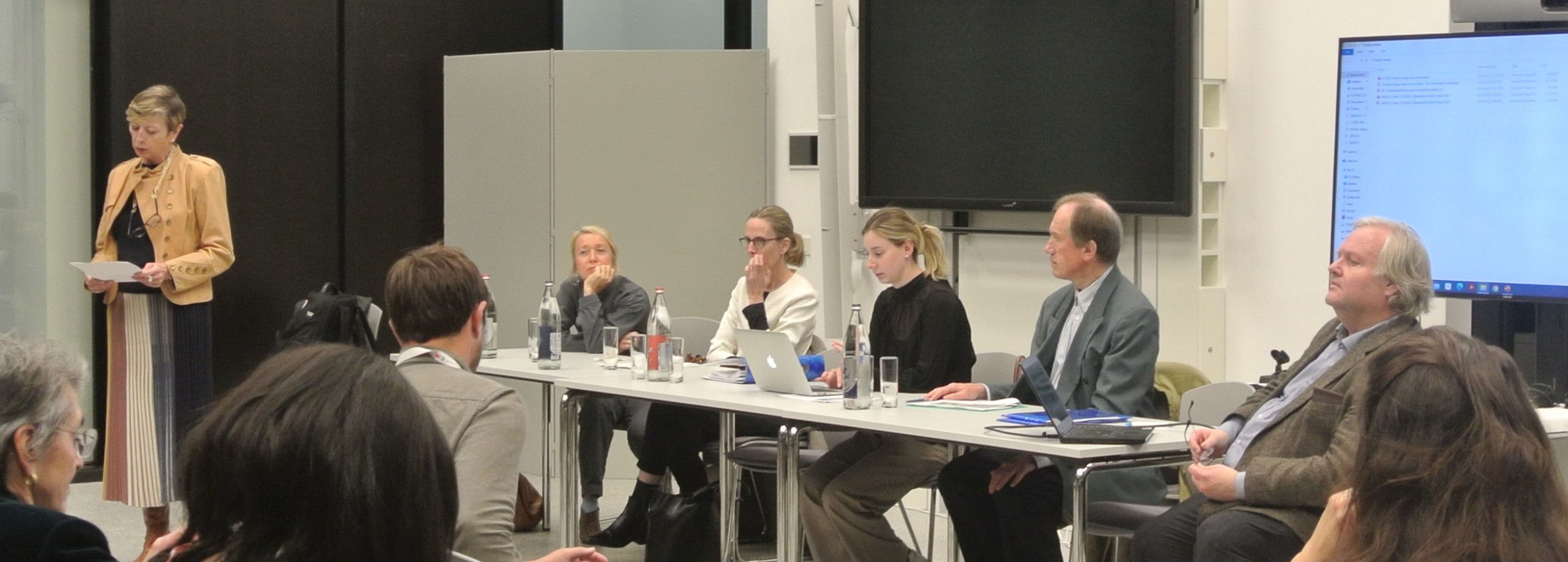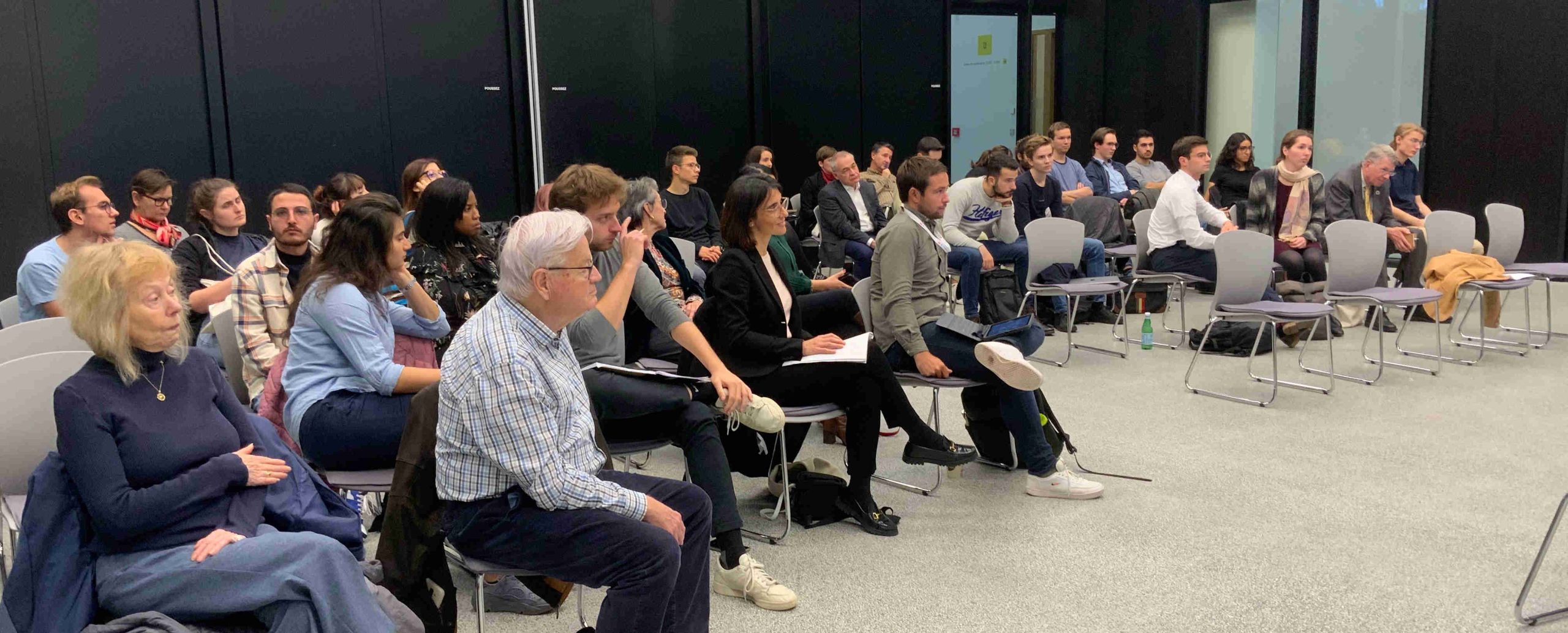Panel discussion on the Governance of Climate Change:
Multilateralism, Human Rights and Democratic Deliberation
Event co-organized by the UNESCO Chair in Human Rights at the University of Luxembourg and the Association Luxembourgeoise pour les Nations Unies
University of Luxembourg, Campus Belval, Maison des Sciences Humaines, 25 October 2022
 Left to right: Simone Beck (standing), Gaëlle Tavernier, Anne Goedert, Lisa Verhasselt, André Rollinger, Robert Harmsen
Left to right: Simone Beck (standing), Gaëlle Tavernier, Anne Goedert, Lisa Verhasselt, André Rollinger, Robert Harmsen
On 25 October 2022, the UNESCO Chair in Human Rights at the University of Luxembourg and the Association Luxembourgeoise pour les Nations Unies (ALNU) co-organized a panel discussion entitled “The Governance of Climate Change: Multilateralism, Human Rights and Democratic Deliberation” at the Maison des sciences humaines on the Belval Campus.
Moderator:
- Simone Beck, President, The Luxembourg Commission for Cooperation with UNESCO
Panelists:
- Anne Goedert, Ambassador at Large for Human Rights, Ministry of Foreign and European Affairs
- Robert Harmsen, UNESCO Chair in Human Rights, University of Luxembourg
- André Rollinger, President, Association Luxembourgeoise pour les Nations Unies
- Gaëlle Tavernier, General Manager, Pro Sud
- Lisa Verhasselt, Doctoral Researcher, University of Luxembourg
In her introduction, the moderator, Mrs. Simone Beck, President, The Luxembourg Commission for Cooperation with UNESCO, explained that the first international Conference on global biosphere protection, UNESCO’s Intergovernmental Conference for Rational Use and Conservation of the Biosphere, took place in Paris in 1968, and was a turning point in the establishment of international politics concerning the environment and biodiversity. She then opened the panel with a set of open questions, in which both the speakers and the Commission for Cooperation with UNESCO were also briefly presented. After this brief introduction, the panel entered into the heart of the matter.
The first speaker was André Rollinger, President, Association Luxembourgeoise pour les Nations Unies (ALNU), who explained that the Paris agreement in 2015[i] forms the basis of all the yearly conferences about climate change and includes a specific agreement about Indigenous Peoples and their knowledge and values oriented towards nature. They steward over 80% of the planet’s remaining biodiversity.
Mr. Rollinger briefly presented the ALNU project 2022 on “Defenders and actors of human rights, indigenous peoples and peasants in relation to environmental protection and sustainable development”, which brought together 50 students from three Luxembourgian secondary schools, resulting inter alia in the elaboration and adoption by the students of a detailed set of two resolutions. A corresponding final merged resolution was sent to the Ministers of Foreign and European affairs, of Education, Children and Youth, of Development Cooperation and Humanitarian Affairs and of Environment, Climate, and Sustainable development. In his reply, the minister of foreign and European affairs, Mr. Asselborn, congratulated all the participants and expressed his conviction that the involvement of youth in social environmental projects is necessary to achieve the SDGs in the future. Finally, Mr. Rollinger stressed the importance of intergenerational dialogue, giving knowledge and power to young people as actors.
The following presentation was given by Professor Robert Harmsen, UNESCO Chair in Human Rights, University of Luxembourg, who introduced the governance challenges by looking at the interactions between the climate change and human rights regimes. These two systems have come together only recently, raising questions as to the exact place which should be assumed by human rights considerations in climate change policy.
It was only in 2008 that the UN started to look at climate change from a human rights perspective. In Cancun in 2010,[ii] it was officially affirmed that the climate change regime should recognize human rights. Subsequently, some national governments have sought to reinforce the links between the two regimes, notably those which are signatories to the 2015 Geneva Pledge for Human Rights in Climate Action.[iii] With human rights coming to be increasingly embedded in the climate change regime, and vice versa, this leaves the question of what practical or effective impact these developments have had. Professor Harmsen argued that it would be better to conceive of a ‘rights-informed’ rather than a ‘rights-based’ approach, given that it is difficult to pin down a specific climate change event to a specific violator. Invoking human rights does not resolve the problems, but it does better inform you about them.
He concluded by stressing the need to create a deliberative space for citizens, the importance of the transparency of processes, the necessity of ensuring that cooperation on climate change can escape the more general erosion of multilateral institutions, and the (only partially addressed) imperative of giving a greater voice to the unheard in international fora.
The third speaker was Anne Goedert, Ambassador at Large for Human Rights, Ministry of Foreign and European Affairs, who began by explaining that her role is to coordinate the human rights issue within the government and that she is currently dealing with some major issues, including “business and human rights” and Luxembourg’s feminist foreign policy, Luxembourg being one of only 7 or 8 countries in Europe that has such a policy.[iv]
She explained that Luxembourg was elected as a first-time member of the human rights council in October 2021, for the mandate of 2022-2024, with the priorities of protection of human rights defenders, gender equality, protection of the child, and human rights and climate change. She mentioned that they are trying to create strong mandates for the special rapporteurs, including on the mandates of “human rights and the environment”, and were amongst the countries pushing for the creation of the newer mandate leading to the nomination of a “Special Rapporteur on the promotion and protection of human rights in the context of climate change”.
Before introducing the next speaker, Mrs. Simone Beck gave an example which brings together the issues of the environment, women’s situation, and women’s education. She explained that in Africa it is the role of the women and girls to fetch water, which often requires them to walk for hours, during which time they are not only exposed to danger, but this also prevents them from going to school or doing productive work.
The fourth speaker was Lisa Verhasselt, Doctoral Researcher, University of Luxembourg, who addressed the topics of deliberative democracy with the aim of involving citizens more in decision making and of climate governance. She presented the functioning and recommendations of the two recent Luxembourgian climate assemblies: the Biergerkommitee 2050 (BK 2050)[v], centering on Claude Turmes, the Minister for Energy and Spatial Planning and the Klima Biergerrot (KBR)[vi], centering on Xavier Bettel, the Prime Minister. The former included 30 members and 10 substitutes and produced 44 recommendations, while the latter had 60 members and 40 suppliants and produced 56 recommendations.
Ms. Verhasselt then further summarized the findings of a survey conducted of the participants in the processes. This interestingly highlighted a strong belief in both the deliberative capacity and knowledgeability of citizens, but underlined that there was markedly less confidence in such exercises having an influence on the political process.
The presentation nevertheless concluded by outlining the possible contributions of deliberative democracy to policymaking in response to climate change, enriching dialogue and understanding, while also potentially playing a wider agenda-setting role. Furthermore, citizens can learn from scientists and other witnesses about the complexities of climate science and policy.
The final speaker was Gaëlle Tavernier, General Manager, Pro Sud, who began by enlightening us that we were currently holding this seminar within a biosphere reserve known as the Minett UNESCO biosphere[vii] as of 28 October 2020, where the name reflects this former mining area. The biosphere project aims to enhance the relationship between man and nature and to develop a locally focused model of sustainability. There are 700 biospheres in 124 countries[viii]. In Luxembourg, 11 municipalities are concerned by this project. The main missions of this project are regional development, regional food production, the Minett nature and education learning lab, and the promotion of the region, using both top-down and bottom-up approaches.
Mrs. Tavernier concluded by referring to the RAD strategy, which explains that we can respond to the trajectory of change by Resisting (working to maintain or restore based upon historical or acceptable current ecosystem conditions), Accepting (allowing an ecosystem to change without intervening), or Directing (actively shaping ecosystem change toward preferred new conditions).
After all the presentations, a short but intense discussion was engaged with the public. One of the persons in the public intervened presenting himself as working for Pro Sud on the Minett UNESCO Biosphere project. He wished that more people could take part in the projects organized since they represent a possibility for young people to intervene and act concretely in the protection of the environment. Other questions addressed the broad themes of participation, democracy, and the fight against climate change, with a particular emphasis in the discussion on the need for wider civil society mobilization, both prompting and moving beyond governmental action.
The event, which overall lasted around one and a half hours, was followed with great interest and enthusiasm by the audience of around fifty people, composed of students, professors, and members of the general public – no doubt reflecting the crucial – indeed, existential – importance of the issues under discussion.

N.B. This report was established with contributions from Ulisse Saverio Bassi for the UNESCO Chair in Human Rights and Alan Sillitoe for ALNU.
The intervention of ALNU concerning their project 2022 can be found as an addendum to the report on this event at the following link: www.alnu.lu/seminaires
[i] https://unfccc.int/process-and-meetings/the-paris-agreement/the-paris-agreement
[ii] https://unfccc.int/process/conferences/the-big-picture/milestones/the-cancun-agreements
[iii] https://carbonmarketwatch.org/wp-content/uploads/2015/02/The-Geneva-Pledge-13FEB2015.pdf
[iv] https://chronicle.lu/category/abroad/35646-luxembourg-presents-feminist-foreign-policy-at-international-meeting
[v] https://assets.ctfassets.net/oo7veeicznh1/49ZKUMfEAJH018dApGxqWb/cedd9d75fe7c110183388a833af7be5c/f5085c808193-BK2050_Brochure_ENG.pdf
[vi] https://www.klima-biergerrot.lu/en
